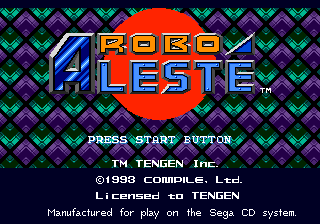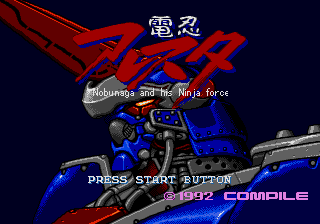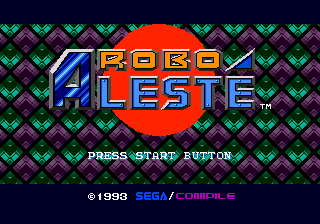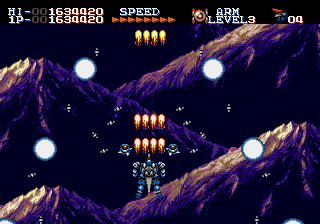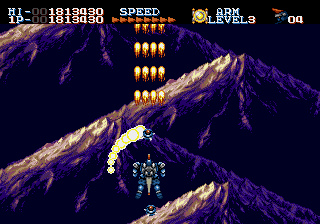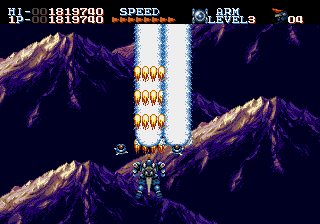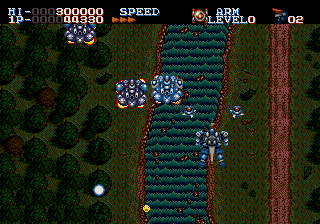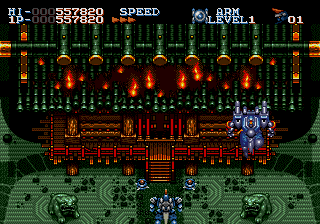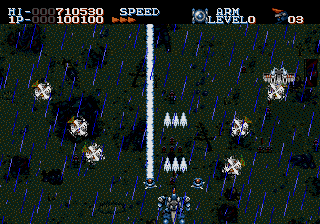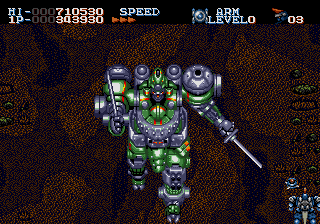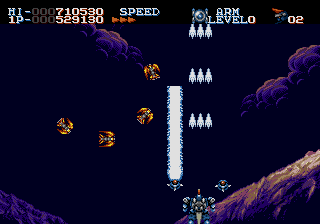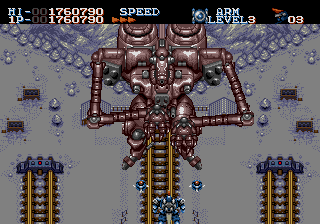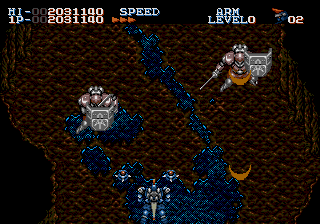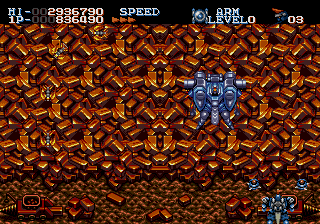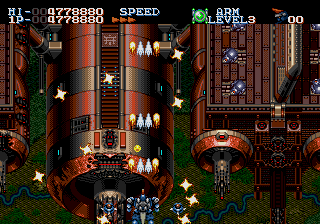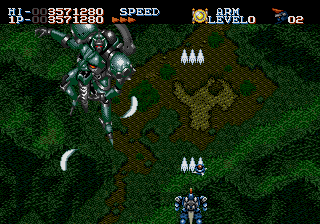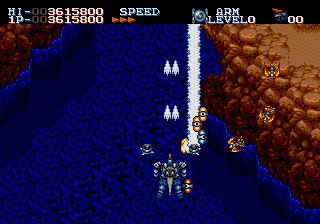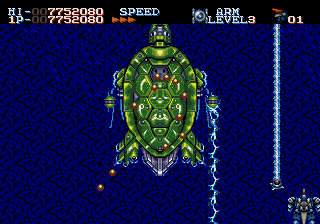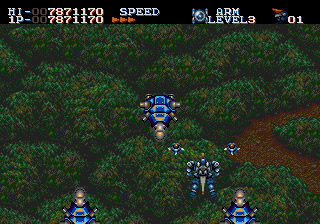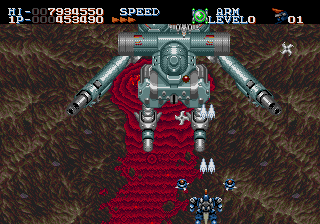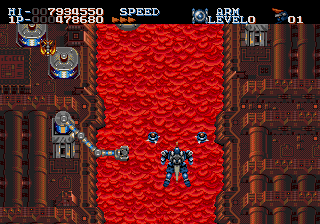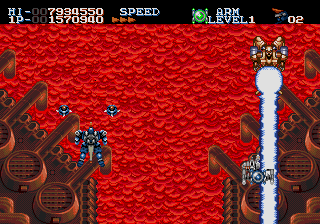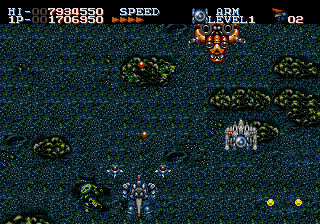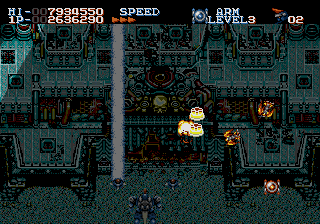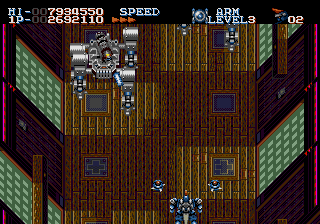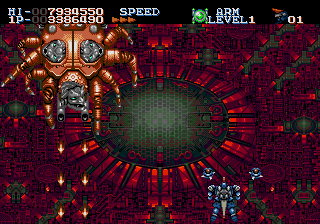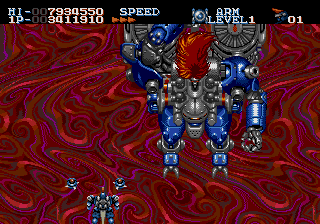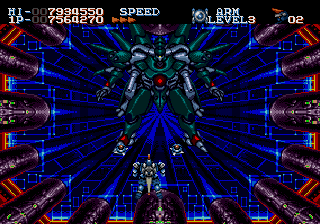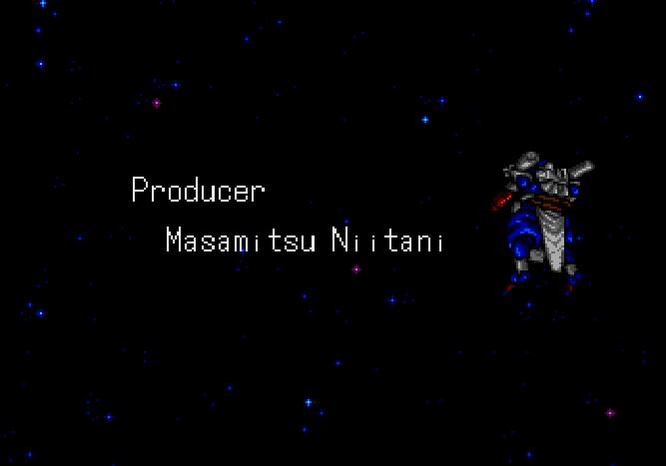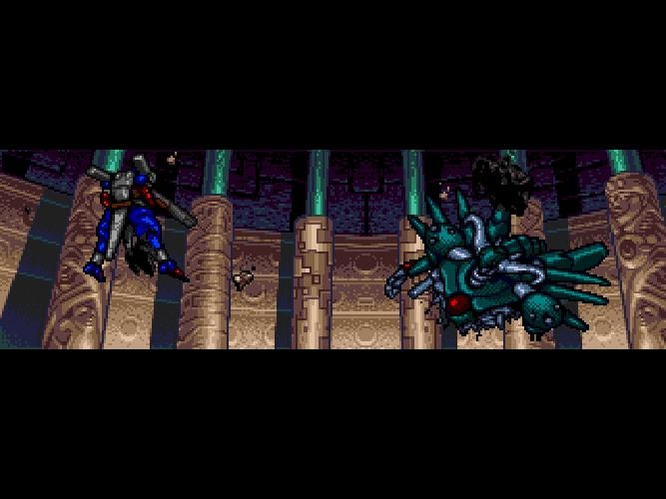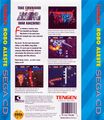Robo Aleste
From Sega Retro
| |||||||||||||||||||||||||||||||||||
| Robo Aleste | |||||||||||||||||||||||||||||||||||
|---|---|---|---|---|---|---|---|---|---|---|---|---|---|---|---|---|---|---|---|---|---|---|---|---|---|---|---|---|---|---|---|---|---|---|---|
| System(s): Sega Mega-CD | |||||||||||||||||||||||||||||||||||
| Publisher: Compile (Japan), Tengen (US), Sega (Europe) | |||||||||||||||||||||||||||||||||||
| Developer: Compile | |||||||||||||||||||||||||||||||||||
| Genre: Shooting[1] | |||||||||||||||||||||||||||||||||||
| Number of players: 1 | |||||||||||||||||||||||||||||||||||
|
Dennin-Aleste: Nobunaga and his Ninja force (電忍アレスタ) is a vertically scrolling shoot-'em-up developed by Compile exclusively for the Sega Mega-CD. Outside of Japan, it was released as Robo Aleste.
It is part of the Aleste series of games and the successor to M.U.S.H.A. It is one of only two Aleste titles to ever use the name outside of Japan (the other being Super Aleste for the Super NES).
Contents
Story
Giant, humanoid mecha called Dennin (電忍, meaning "electric ninja") have mysteriously appeared in 16th century feudal Japan, radically changing the nature of warfare.
Kagerou is the sole surviving member of the White Fang, the robot ninja army of Oda Nobunaga, a daimyo known as the "Demon King." He takes control of the Aleste, an eight-metre tall, steam-powered mech, and uses it to defeat Nobunaga and the other warring feudal lords.
Gameplay
The game is a vertically scrolling shooter similar to M.U.S.H.A. The player controls a flying robot, which moves in any direction with the D-Pad. The player can change its movement speed (between eight different levels) with ![]() . Its main weapon is firing a stream of kunai. This weapon is initially a single stream but can be upgraded up to four streams by collecting Power Chips (and then those streams can be further upgraded, two at a time, to change the throwing knives into fireballs). The Aleste can also acquire a secondary weapon by collecting items. Picking up an item for the currently equipped special weapon upgrades the weapon, up to four levels (from 0 to 3). Picking up an item for a different special weapon changes to that weapon but keeps the same weapon level. Both weapons have rapid-fire and unlimited ammunition. The Aleste fires its main weapon alone with
. Its main weapon is firing a stream of kunai. This weapon is initially a single stream but can be upgraded up to four streams by collecting Power Chips (and then those streams can be further upgraded, two at a time, to change the throwing knives into fireballs). The Aleste can also acquire a secondary weapon by collecting items. Picking up an item for the currently equipped special weapon upgrades the weapon, up to four levels (from 0 to 3). Picking up an item for a different special weapon changes to that weapon but keeps the same weapon level. Both weapons have rapid-fire and unlimited ammunition. The Aleste fires its main weapon alone with ![]() and its main weapon and secondary weapon simultaneously with
and its main weapon and secondary weapon simultaneously with ![]() .
.
The robot comes with two fixed options in front of it at all times, which can never be destroyed. The options absorb enemy bullets and damage enemies on contact. Secondary weapons are fired from these options. The options can be launched at enemies by holding ![]() for a moment to charge them and then releasing the button.
for a moment to charge them and then releasing the button.
The Aleste is destroyed if hit by an enemy, which also downgrades its main weapon by one level. If the Aleste is hit while possessing a special weapon, it drops it as an item that can be collected again. The game ends if the player runs out of lives, but the player has infinite continues.
Weapons
The weapons from M.U.S.H.A. all return, albeit with different colors.
| Exploding Flower | |
|---|---|
| Releases a barrage of bomblets, which explode upon impact with the ground or an enemy. The explosion persists for a short time after impact. | |
| Ninja Star | |
| Causes the options that normally fly in front of the Aleste to encircle it in a protective shield. The options actively attack any nearby enemies. | |
| Thunderbolt Ray | |
| Fires blue bolts of electricity that pierce through targets. It starts as two thin beams but upgrades to one, two, and eventually three thicker beams. | |
| Flying Shadow Formation | |
| Fires large shuriken in several directions. Initially fires in four directions, but this expands to eight directions at the higher levels. |
Items
The Aleste is temporarily invincible after collecting an item.
| Power Chip | |
|---|---|
| Upgrades the attack speed and power of the standard weapon. The initial upgrades add an additional beam in parallel, up to 4. The next two upgrades change the throwing knives into fireballs (first the outside two beams, then the inside two beams). | |
| Exploding Flower | |
| Equips the Aleste with the Exploding Flower special weapon or upgrades it if already equipped. | |
| Ninja Star | |
| Equips the Aleste with the Ninja Star special weapon or upgrades it if already equipped. | |
| Thunderbolt Ray | |
| Equips the Aleste with the Thunderbolt Ray special weapon or upgrades it if already equipped. | |
| Flying Shadow Formation | |
| Equips the Aleste with the Flying Shadow Formation special weapon or upgrades it if already equipped. |
Stages
| Burning Village | |
|---|---|
|
Boss: 飛竜 (鉄) | |
| Imagawa Frontline | |
|
Boss: 武者王 (今川 義元) | |
| Mountain Railroad | |
|
Boss: 上杉 謙信 | |
| Mine Cavern | |
|
Boss: 飛竜改 (鉄) | |
| Airship | |
|
Boss: 武田 信玄 | |
| Canal Passage | |
|
Boss: 長宗我部 元親 | |
| Volcano | |
|
Boss: 島津 貴久 | |
| Mechanical Plant | |
|
Boss: 冴刃 | |
| Assault on Mouri's Palace | |
| Inside Mouri's Palace | |
|
Boss: 毛利 元就 | |
| Hyperdimensional Warp | |
|
Mid-boss: 火竜 (鉄) Boss: Astaroth | |
Versions
Robo Aleste versions of the game contain small balance changes to make the game easier. The big two changes are that dynamic rank does not rise as quickly, and that the yellow weapon has been buffed. The Japanese version also has a bunch of character dialogue stored as Red Book audio on the disc, but many of these tracks ended up being unused. The respective dialogues simply appeared as text.
Localised names
| Language | Localised Name | English Translation |
|---|---|---|
| English | Robo Aleste | Robo Aleste |
| English (US) | Robo Aleste | Robo Aleste |
| Japanese | 電忍アレスタ | Dennin Aleste |
Production credits
Overseas version
- Producer: Masamitsu Niitani
- Planning: Kerol
- Programmers: Takin, Koichi Yamashita, Jemini Hirono
- Character Designers: Hiroshi Ryuoh-in, Shin-ichi Ohnishi, Syunsuke "Great" Takashima, Kerol
- Mechanic Designers: Hiroshi Ryuoh-in, Hiroki Kodama
- Continuity Writers: Kengo Morita, Zod Hoshijima, Kerol
- Computer Graphics: Hiroki Kodama, Shin-ichi Ohnishi, Hiroshi Ryuoh-in, Kengo Morita, Gennosuke Yumi
- Sound Effects: Einosuke Nagao
- Sampling: Pon Imasue
- Cooperators: Yasutoshi Akiyama, Kasumi Hakuryuh-hou, Kazunari Bishamonten, Lemontea
- Cast of Voices: Terry Ueyama, Xanthe Smith, Barry Gjerde, Geraldine Twilley, Robert B. Spenser
- Cooperation
- By Word: Japan Media Programming co., ltd.
- Compact Disc Audio
- All music produced and arranged by: Katsumi Tanaka
- Original music written by: Katsumi Tanaka, Satoshi Shimazaki
- Original sound recording made by: LMS Recordings
- All songs published by: LMS Music inc.
- Full digital process mastered at: Hit Factory Japan
- Multi Audio at Visual Sequence
- Produced and engineered by: Katsumi Tanaka
- All CD music are: Virtual Stereo Treated
- Explanatory leaflet Staff: Kazuhiro Kohnoue, Youichi Utsumi, Katsuhiko Ikeda, Zod Hoshijima, Hiroshi Ryuoh-in
- Supervisor: Jemini Hirono
- Directed by: Kerol, Compile
Japanese version
- プロデューサー: 仁井谷 正充
- 企画: ケロル
- プログラマー: Takin, 山下 孝一, じぇみに 広野
- キャラクターデザイン: 龍王院 弘, 大西 伸一, 高島 "グレート" 俊介, ケロル
- メカニックデザイン: 龍王院 弘, 小玉 "俺に惚れろ" 浩樹
- 絵コンテ: 森田 時雨, ゾッド 星島, ケロル
- グラフィック: 小玉 "俺に惚れろ" 浩樹, 大西 伸一, 龍王院 弘, 森田 時雨, 弓 弦之助
- 効果音: 長尾 英之助
- サンプリング: 今末 PON
- 協力: 秋山 泰俊, 白龍鳳 霞, 毘沙門天 和鳴, 果物茶
- 声の出演: 緑川 光, 久川 綾, 神谷 明, 寺瀬 めぐみ, 岸野 幸正, 森山 周一郎
- 協力: 青二プロ, 吉江企画
- Compact Disc Audio
- All music produced and arranged by: Katsumi Tanaka
- Original music written are: Katsumi Tanaka, Satoshi Shimazaki
- Original sound recording made by: LMS Recordings
- All songs published by: LMS Music inc.
- Full digital process mastered at: Hit Factory Japan
- Multi Audio at Visual Sequence Produced and engineered by: Katsumi Tanaka
- All CD Recording Processed: Virtual Stereo Treated
- マニュアルスタッフ: 河野上 和廣, 内海 庸一, 池田 克彦, ゾッド 星島, 龍王院 弘
- スーパーバイザー: じぇみに 広野
- 監督: ケロル
- 制作: コンパイル
Digital manuals
Magazine articles
- Main article: Robo Aleste/Magazine articles.
Promotional material
Physical scans
| Sega Retro Average | |||||||||||||||||||||||||||||||||||||||||||||||||||||||||||||||||||||||||||||||||||||||||||||||||||||||||||||||||||||||||||||||||
|---|---|---|---|---|---|---|---|---|---|---|---|---|---|---|---|---|---|---|---|---|---|---|---|---|---|---|---|---|---|---|---|---|---|---|---|---|---|---|---|---|---|---|---|---|---|---|---|---|---|---|---|---|---|---|---|---|---|---|---|---|---|---|---|---|---|---|---|---|---|---|---|---|---|---|---|---|---|---|---|---|---|---|---|---|---|---|---|---|---|---|---|---|---|---|---|---|---|---|---|---|---|---|---|---|---|---|---|---|---|---|---|---|---|---|---|---|---|---|---|---|---|---|---|---|---|---|---|---|---|
|
| 74 | |
|---|---|
| Based on 25 reviews | |
Technical information
- Main article: Robo Aleste/Technical information.
References
- ↑ 1.0 1.1 https://sega.jp/fb/segahard/mcd/soft_licensee.html (Wayback Machine: 2019-06-10 17:56)
- ↑ Sega Visions, "August/September 1993" (US; 1993-xx-xx), page 104
- ↑ GamePro, "August 1993" (US; 1993-xx-xx), page 17
- ↑ https://groups.google.com/g/rec.games.video.sega/c/CcbcYvN2iwY/m/OJK6P0ssOU8J
- ↑ 5.0 5.1 GamePro, "September 1993" (US; 1993-xx-xx), page 48
- ↑ 6.0 6.1 MegaTech, "April 1993" (UK; 1993-03-20), page 29
- ↑ Mega Power, "February 1994" (UK; 1994-01-20), page 79
- ↑ Select Round, "Septembre 1993" (FR; 1993-xx-xx), page 2
- ↑ 9.0 9.1 Video Games, "9/93" (DE; 1993-08-25), page 43
- ↑ File:Robo Aleste MCD credits.pdf
- ↑ File:DenninAleste MCD JP SSCredits.pdf
- ↑ Beep! MegaDrive, "January 1993" (JP; 1992-12-08), page 31
- ↑ Consoles +, "Février 1993" (FR; 1993-0x-xx), page 96
- ↑ Electronic Games (1992-1995), "October 1993" (US; 1993-09-23), page 85
- ↑ Electronic Gaming Monthly, "August 1993" (US; 1993-xx-xx), page 30
- ↑ Mean Machines: The Essential Sega Guide, "" (UK; 1993-11-18), page 124
- ↑ Famitsu, "1992-11-27" (JP; 1992-11-13), page 40
- ↑ GameFan, "Volume 1, Issue 3: January 1993" (US; 199x-xx-xx), page 11
- ↑ GameFan, "Volume 1, Issue 9: August 1993" (US; 1993-xx-xx), page 10
- ↑ Hippon Super, "November 1992" (JP; 1992-10-03), page 45
- ↑ Joypad, "Janvier 1993" (FR; 199x-xx-xx), page 41
- ↑ Joypad, "Septembre 1993" (FR; 1993-0x-xx), page 79
- ↑ Joystick, "Janvier 1993" (FR; 199x-xx-xx), page 231
- ↑ Mega Drive Fan, "March 1993" (JP; 1993-02-xx), page 59
- ↑ Mega, "February 1993" (UK; 1993-01-21), page 44
- ↑ Mega Force, "Mega-CD Force: Le Supplément Spécial Mega-CD" (FR; 1993-xx-xx), page 24
- ↑ Mega Fun, "09/93" (DE; 1993-08-18), page 42
- ↑ MegaTech, "February 1993" (UK; 1993-01-20), page 26
- ↑ Player One, "Octobre 1993" (FR; 1993-xx-xx), page 108
- ↑ Sega Pro, "February 1993" (UK; 1993-01-14), page 59
- ↑ Sega Pro, "April 1993" (UK; 1993-03-11), page 74
- ↑ Sega Zone, "February 1993" (UK; 1993-01-20), page 38
- ↑ Sega Saturn Magazine, "September 1995" (JP; 1995-08-08), page 86
- ↑ Sonic the Comic, "September 4th 1993" (UK; 1993-09-04), page 11
- ↑ Video Games, "1/94" (DE; 1993-12-19), page 44
| Robo Aleste | |
|---|---|
|
Main page | Comparisons | Maps | Hidden content | Magazine articles | Reception | Technical information | |
| Aleste/Power Strike games for Sega systems/published by Sega | |
|---|---|
| Power Strike (1988) | Power Strike II (1993) | |
| M.U.S.H.A. (1990) | |
| GG Aleste (1991) | Power Strike II (1993) | GG Aleste 3 (2020) | |
| Robo Aleste (1992) | |
| M.U.S.H.A. (2008) | |
| Aleste Collection (2020) | |
| Aleste-related media | |
| Aleste Collection: Music Album (2022) | |
- 1 player games
- JP Mega-CD games
- All JP games
- US Mega-CD games
- All US games
- EU Mega-CD games
- All EU games
- DE Mega-CD games
- All DE games
- FR Mega-CD games
- All FR games
- UK Mega-CD games
- All UK games
- Mega-CD games
- 1992 Mega-CD games
- All 1992 games
- Mega-CD shoot-'em-up games
- All shoot-'em-up games
- All games
- Bad translation
- Old-style rating (t2)
- Rating without source
- Update ratings template
- 1 old ratings
- Robo Aleste
- Aleste
- Mega Drive Mini 2 games
